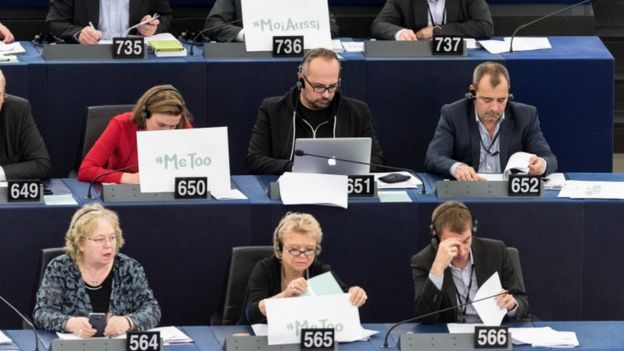By Jenilyn Brhel
Impunity Watch Reporter, Europe
BRUSSELS, Belgium – As part of a campaign to speak out against sexual harassment and assault, several Members of the European Parliament have recently joined the viral #MeToo movement.

At a meeting in Strasbourg, France to discuss sexual harassment, men and women from across parliament displayed placards in front of them with the phrase “#MeToo.” Several members spoke out about their experiences and discussed ways to combat the problem.
The #MeToo movement originated in the late 90s, when activist Tarana Burke, program director for Brooklyn-based Girls for Gender Equality, was a youth camp director. She spoke with a young child about the heinous sexual abuse she had been subjected to and came up with the mantra “me too” as a statement of strength and solidarity.
The movement has gained worldwide attention in recent weeks following the torrent of accusations against Hollywood producer Harvey Weinstein. Actress Alyssa Milano recently revitalized the statement, and it has since taken off on social media.
The debate in Europe comes amid contentions that European authorities are not doing enough to address sexual harassment, assault and rape.
“At least one in every three women has been victim of some sort of physical or sexual violence,” European Commissioner for Trade Cecelia Malmstrom said during the debate. “But these statistics do not tell enough personal stories, and the reason we are debating this today is of course because of the global movement of #MeToo.”
Terry Reintke, a Green Party parliament member, said “Me too. I have been sexually harassed, just like millions of other women in the European Union, and I think it’s about time that we say that we should not be ashamed, but that the perpetrators should be ashamed.”
Many victims are afraid to make official complaints because of the stigma associated with coming forward and for fear that their careers may be ruined if they do.
Members of Parliament wrote a letter addressed to Antonio Tajani, president of the European Parliament, calling for external investigations into sexual harassment at the institution in response to allegations. The letter also demands that gender awareness and harassment training be provided to all parliamentary staff.
Several lawmakers also support adoption of the Istanbul Convention. This would require members to establish comprehensive systems aimed at preventing sexual violence against women.
The convention has thus far been ratified by 15 of the EU’s 28 member states.
For more information, please see:
CNN – An Activist, A Little Girl and The Heartbreaking Origin of ‘Me Too’ – 19 October 2017
BBC News – EU Parliament Members Demand Action on Sexual Harassment – 25 October 2017
The Independent – MeToo: Members of the European Parliament Protest Against Sexual Harassment – 25 October 2017
The New York Times – A #MeToo Moment for The European Parliament – 25 October 2017






